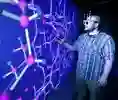



Artificial intelligence (AI) is rapidly transforming the way we live and work. This degree gives you the knowledge and skills you need to be part of the AI future.
Gain a rock-solid grounding in the fundamentals of computing, information science and informatics. Then gain specialist knowledge and experience in the development of intelligent systems, including machine learning, algorithms and complexity and visual computing.
The experience and technical expertise you’ll gain will put you in high demand when it’s time to enter the job market in this fast-moving industry.
About this course
Explore how AI is rapidly transforming the way we live on this career-driven degree.
From self-driving cars to medical diagnosis, AI and machine learning systems are helping people make better decisions, improve safety and reduce our carbon footprint.
Learn within industry-standard facilities, develop advanced Python programming skills and create your own software. You’ll study essential areas such as databases and networks, operating systems and cloud – as well as the increasing impact of AI on everyone in society.
Compete in international events like the Microsoft Imagine Cup. Or rise to the challenge of creating a computer game over a weekend in our Three Thing Game. You’ll also benefit from our strong links with companies like EA, Sony and Black Marble with frequent talks by experts in the trade.
Designed with your future in mind, you’ll take a professional development module in your first year. Bolster your experience further by choosing to spend a paid year in industry, all thanks to our strong connections with some of the biggest names in the business. And you’ll develop your own project in your final year, so you can demonstrate your skills to potential employers.
Is AI humanity’s friend or end? It’s up to us to decide.
Module options
Our five undergraduate Computer Science courses share the same compulsory modules in the first year. This gives you a foundation of knowledge across the whole subject area and the chance to explore what really interests you. You're then better placed to choose your modules in the later years of our BSc Computer Science, or switch to a different pathway to specialise in games programming, software engineering, robotics or AI.
Filters
Programming Portfolio
Gain the practical knowledge to design, implement and test algorithms. The module uses lectures to deliver concepts, a practice lab to apply the programming concepts learnt by developing programs to solve problems. You will take part in hands-on practical assessments, which will enable you to acquire extensive programming skills in an industry standard programming language. We will support you whether you are new to programming or have existing skills.
core
40 credits
Computational Thinking
This module, Computational Thinking, is essential for developing computer-based solutions. This module will enable you to develop your knowledge and understanding of the key mathematical underpinnings of computer science, to aid you in problem solving and programming. The development of your competence in logic, mathematics and statistics will also provide evidence of your numeracy and more advanced skills and is valued by employers.
compulsory
20 credits
Algorithms and Data Structures
Start to think like a computer. This module explores logic, data storage and algorithms with the use of practical demonstrations and activities. Operating in parallel with programming-focused modules, we will develop a toolkit of key concepts from a theoretical (non-code) perspective, facilitating a better understanding of these fundamentals. Topics to expect include pseudocode, state machines, essential keywords, common data structures, sort algorithms and search algorithms. You will learn methods to analyse and compare algorithms and their constituent parts in order that you may better design, evaluate and develop effective, efficient and performant software solutions.
compulsory
20 credits
Architectures, Operating Systems and the Cloud
In this module you will explore the fundamental properties of computers that allow them to execute programs. You will learn about how computers are made to work in hardware and simulation (virtual machines). A collection of virtual machines is a cloud, and this module allows you to get experience with the development of your own cloud using appropriate platforms.
compulsory
20 credits
Professional Development
Employers want much more than discipline-specific skills. This module sets you up to grow your professional skills and awareness, when working both individually and as part of a team. Develop your appreciation of the challenges within the sector, and how technology can help to solve worldwide issues. Begin a personal portfolio that you will add to over your degree. Work as part of a team to produce a design prototype, demonstrating your personal professional development. Through researching your discipline, you will understand the range of career roles available and what you need to do to progress in them.
compulsory
20 credits
Design, Develop, Deploy
Our flagship software development module. You'll use contemporary software development tool chains to experience authentic software creation and deployment, applying techniques such as agile project management, test-driven development and continuous integration and deployment.
core
40 credits
Databases and Networks
You'll be introduced to the core components of any online information system that drives the information we use today. Learn how modern applications fetch data from servers and how that information can be stored and retrieved efficiently. You will solve a real-world problem by developing a networked database.
compulsory
20 credits
Artificial Intelligence
Data is one of the 21st century’s most valuable commodities. In this module you will learn how to analyse, validate and interpret it to inform decision making. You will implement artificial intelligence techniques to solve a real world problem. Nationally, there is a widely recognised shortage of qualified Artificial Intelligence (AI) and data scientists to meet the needs of industry.
compulsory
20 credits
Data Analysis and Visualisation
Data analytics has rapidly become a part of all of our lives, and is an increasingly sought-after skill in the jobs market. In this module you'll learn the theoretical and practical skills to analyse any dataset independently, starting from exploratory analysis of a new dataset for hypothesis finding, over-choosing and comparing different algorithms, and presenting and explaining your results quantitatively and visually. You will learn to train models of different complexities that can make predictions or uncover hidden patterns in data, making responsible and fair decisions that can help improve our lives.
compulsory
20 credits
Our facilities


Watchlist
BSc Computer Science (Artificial Intelligence)
Course overview
2 mins
The impact of AI
Course Highlight
2 mins
Rand Nessif
Unsame Stories
2 mins
See our incredible labs
Course Highlight
2 mins
Featured academics
You’ll be taught by talented researchers who carry out world-leading research in areas such as artificial intelligence and machine learning, intelligent and interactive systems, robotics, simulation, visualisation, and mobile and distributed computing.
Our courses are shaped by their expertise.

Professor Dhaval Thakker
Professor of Artificial Intelligence
Dhaval’s expertise focuses on how Artificial Intelligence and the Internet of Things can be used to improve society. His research exploring the role of these technologies in the circular economy, digital health and smart cities.

Dr David Parker
Lecturer in Computer Science
David loves using software to solve problems and oversees many of our game jams and programming competitions such as the Three Thing Game and the Global Game Jam. His research focuses on improving characteristics of safety-critical systems.
Entry Requirements
What do I need?
This course is currently available through Clearing, which means our entry requirements are a bit different to what they would normally be.
At Hull, you're a name not a number. During Clearing, we look at all of your qualifications and experience, not just your academic grades. We may be able to offer you a place whatever your situation. Get started by completing our eligibility checker, and find out immediately if you could study at the University of Hull.
Have questions? Our admissions team will be happy to help.
Fees & Funding
How much is it?

Future prospects
Computer Science and AI graduates are highly employable. It’s hard to imagine a sector of the modern economy where AI is not used. That means you could go on to a range of job roles in a diverse range of sectors including finance, gaming, telecommunications, retail, information technology, advertising and marketing.
Many of our Computer Science graduates go on to work for industry giants such as Sony, Microsoft, Electronic Arts, Rockstar Games, Dell, Fujitsu and Capita as well as not-for-profit businesses and public sector organisations. Some move on to further study with an MSc or PhD – or even set up and grow their own tech businesses.
Become part of the next generation of futuremakers
Like what you've seen? Then it's time to apply.
The standard way is to apply through UCAS. This will give you the chance to showcase your skills qualities and passion for the subject, as well as providing us with your academic qualifications.
Not ready to apply yet?
Visit our next Open Day, and see all that the University of Hull has to offer. Talk to our lecturers about your subject, find out what university is really like from our current students, and take a tour of our beautiful campus and amazing facilities.
You may also be interested in...
Computer Science is ranked number 7 in the UK (HEIs) for student voice. National Student Survey (NSS) 2025, HEIs only.
90% employability (Computer Science) UK domicile full-time first degree leavers; Higher Education Graduate Outcomes statistics, for the academic year 2022/23, published by the Higher Education Statistics Agency June 2025.
All modules presented on this course page are subject to availability and this list may change at any time.